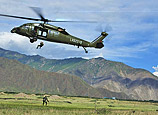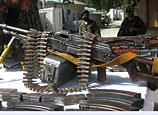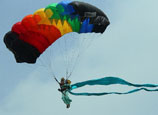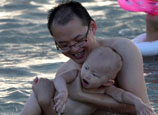
BAGHDAD, July 1 (Xinhua) -- At least 42 people were killed and 48 others wounded in separate violent attacks in Iraq on Monday, police and interior ministry sources said.
A suicide bomber attacked a funeral inside a Shiite religious congregation hall in Muqdadiyah in Iraq's eastern Diyala province, killing at least 23 people and wounding 28 others, a local police source told Xinhua on condition of anonymity.
Another suicide bomber set off his explosive belt at a cafe in Baquba, also in Diyala province, leaving seven people dead and 18 others wounded, the source said.
Muqdadiyah is located about 80 km northeast of Baghdad while Baquba is some 50 km northeast of the capital city.
Earlier in the day, eight former fighters of the government- backed Sahwa paramilitary group were shot dead by gunmen in north of the Iraqi capital Baghdad, an interior ministry source told Xinhua.
The incident occurred when unidentified gunmen wearing military uniforms stormed houses at a village in Tarmiyah area, some 40 km north of Baghdad, and dragged out eight Sahwa men, who previously worked as anti-Qaida paramilitary group fighters, the source said on condition of anonymity.
The attackers took the abducted people to a nearby orchard and shot them dead, the source added.
The Sahwa militia, also known as the Awakening Council or the Sons of Iraq, consists of armed groups, including some powerful anti-U.S. Sunni insurgent groups, who turned their rifles against the al-Qaida network after the latter exercised indiscriminate killings against both Shiite and Sunni Muslim communities.
Also on Monday, a soldier was killed and two others were wounded when a roadside bomb struck a military convoy in the Alhamidhiyah area east of Ramadi, some 110 km west of Baghdad, a local police source told Xinhua.
Unidentified gunmen opened fire and killed a policeman when he was going out of his house in Fallujah, some 70 km west of Baghdad, while other gunmen killed a civilian near a market in the Mafraq district in western Baquba, the police source said.
A local employee of the Ministry of Oil was killed by a sticky bomb attached to a car in the Qayara area in southern Mosul, some 400 km north of Baghdad, another police source said.
No group has so far claimed responsibility for the attacks, but the al-Qaida front in Iraq, in most cases, was responsible for such violent acts in the country, raising fears that the terrorist group could return to widespread violence.
High-profile bomb attacks are still common in Iraq despite the dramatic decrease in violence since its peak in 2006 and 2007, when the country was engulfed in sectarian killings.
The UN Assistance Mission for Iraq (UNAMI) said on Monday a total of 761 Iraqis were killed and another 1,771 wounded in acts of terrorism and violence in June.
The Iraqi capital of Baghdad is the worst-affected province with 950 civilian casualties (258 killed, 692 injured), followed respectively by Salahuddin, Nineveh, Diyala, Anbar, Kirkuk, Babil, Wasit Basra and Najaf, the statement said.
In May, 1,045 Iraqis were killed and 2,397 wounded, which by then was the highest toll since 2008.
Tensions and violence have been escalating between the Sunni and Shiite communities since late December 2012, when the Sunni Muslims started their protests against the Shiite-led government in six of Iraq's predominantly Sunni provinces and the Sunni districts in Baghdad.
















 Taiwan's average temperature in June reaches record high
Taiwan's average temperature in June reaches record high


![]()
